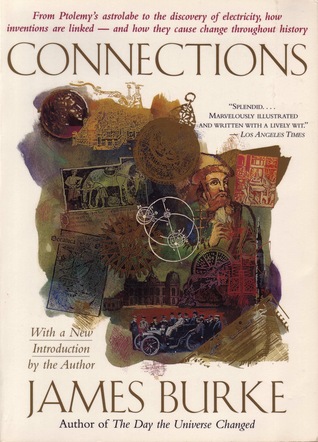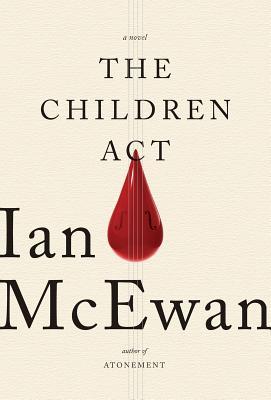Not a bad month, but I had much higher hopes for several of these. Only the Grimes exceeded expectations, and it is a pretty frothy concoction.
Connections
by James Burke
 In this bestselling book, James Burke examines the ideas, inventions, and coincidences that have culminated in the major technological advances of today. He untangles the pattern of interconnecting events, the accidents of time, circumstance, and place that gave rise to major inventions of the world. Says Burke, "My purpose is to acquaint the reader with some of the forces that have caused change in the past, looking in particular at eight innovations - the computer, the production line, telecommunications, the airplane, the atomic bomb, plastics, the guided rocket, and television - which may be most influential in structuring our own futures.... Each one of these is part of a family of similar devices, and is the result of a sequence of closely connected events extending from the ancient world until the present day. Each has enormous potential for humankind's benefit - or destruction."
In this bestselling book, James Burke examines the ideas, inventions, and coincidences that have culminated in the major technological advances of today. He untangles the pattern of interconnecting events, the accidents of time, circumstance, and place that gave rise to major inventions of the world. Says Burke, "My purpose is to acquaint the reader with some of the forces that have caused change in the past, looking in particular at eight innovations - the computer, the production line, telecommunications, the airplane, the atomic bomb, plastics, the guided rocket, and television - which may be most influential in structuring our own futures.... Each one of these is part of a family of similar devices, and is the result of a sequence of closely connected events extending from the ancient world until the present day. Each has enormous potential for humankind's benefit - or destruction."
Note:
Easy to read look at how discoveries and accidents have an incredible impact on progress. The adjacent possible is an incredibly powerful force for progress.
Straight Up or On the Rocks: The Story of the American Cocktail
 The cocktail is as old as the nation that invented it, yet until this entertaining and authoritative account, its story had never been fully told. William Grimes traces the evolution of American drink from the anything-goes concoctions of the Colonial era to the frozen margarita, spiking his meticulously researched narrative with arresting details, odd facts, and colorful figures.
The cocktail is as old as the nation that invented it, yet until this entertaining and authoritative account, its story had never been fully told. William Grimes traces the evolution of American drink from the anything-goes concoctions of the Colonial era to the frozen margarita, spiking his meticulously researched narrative with arresting details, odd facts, and colorful figures. The book includes about one hundred recipes--half of them new for this edition--for both classics and innovations.
Note:
Slim look at drinking in America and the evolution of the cocktail before and after Prohibition. A pleasure to read.
The Invention of the Modern World
 From the preface: 'This is a book which synthesizes a lifetime of reflection on the origins of the modern world. Through forty years of travel in Europe, Australia, India, Nepal, Japan and China I have observed the similarities and differences of cultures. I have read as widely as possible in both contemporary and classical works in history, anthropology and philosophy.'
From the preface: 'This is a book which synthesizes a lifetime of reflection on the origins of the modern world. Through forty years of travel in Europe, Australia, India, Nepal, Japan and China I have observed the similarities and differences of cultures. I have read as widely as possible in both contemporary and classical works in history, anthropology and philosophy.'Prof Macfarlane is also the author of The Culture of Capitalism, The Savage Wars of Peace, The Riddle of the Modern World and The Making of the Modern World, among many others.
Note:
Like listening to a brilliant Oxford professor go on at a dinner party. Enjoyable, but an editor might have helped.
Monkey Business: The Lives and Legends of The Marx Brothers
 Strange but true: this is the first authentic account of the Marx Brothers, their origins and of the roots of their comedy.
Strange but true: this is the first authentic account of the Marx Brothers, their origins and of the roots of their comedy.First and foremost, this is the saga of a family whose theatrical roots stretch back to mid-19th century Germany. From Groucho Marx's first warblings with the singing Leroy Trio, this book brings to life the vanished world of America's wild and boisterous variety circuits, leading to the Marx Brothers' Broadway successes, and their alliance with New York's theatrical lions, George S. Kaufman and the 'Algonquin Round Table'.
Never-before-published scripts, well-minted Marxian dialogue, and much madness and mayhem feature in this tale of the Brothers' battles with Hollywood, their films, their loves and marriages, and the story of the forgotten brother Gummo.
Note:
Disappointing. Didn't learn much, except that they were Vaudeville veterans who gained success on the silver screen. Chico like to gamble. Not recommended
The Children Act
by Ian McEwan





